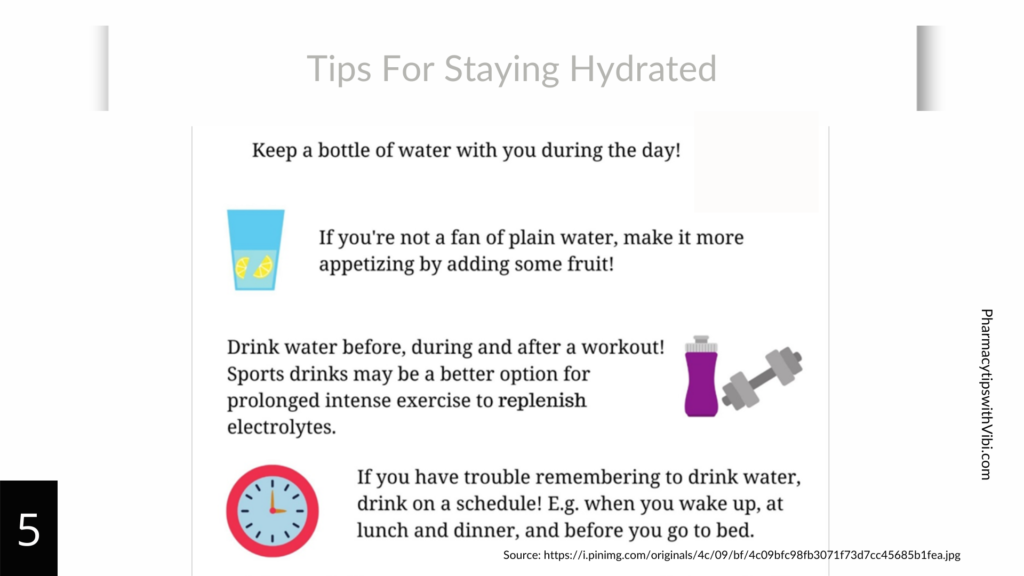Hydration is the process of adding back water to the body that has been lost to keep it functioning properly. Hydration is obtained not only from water intake but also from other fluids such as fruit drinks, tea, milk, food and soft drinks. The difference between these fluids and water is that they can disrupt the homeostatic balance of solutes in the body. Hence, water intake is the main source of hydration for so many people.
Water is essential to life, a fundamental compound that sustains all living organisms. The body of an average adult male is about 60%, and that of an average adult woman is about 55% water.(1)
The importance of water is immense because the fluids in our bodies are primarily composed of water such as; blood, saliva, and synovial fluid (which lubricates our joints).
This essay explores the significance of hydration, the science behind it, its benefits, and practical strategies for maintaining adequate fluid (water) intake.
Why Should We Drink Water?

Water is the main constitute of human body. It participates in many processes of metabolic activities of human beings, such as maintaining the balance of temperature and electrolytes of the body (2).
The balance between the input and output of the water defines the hydration status of humans (3).
Some people drink water mainly to quench their thirst without knowing the countless benefits they gain from that. Water is vital for proper body functioning, such as;
- Regulates body temperature, especially during hot days ( through sweating and respiration)
- Moistens tissues in the eyes, nose and mouth
- Protects body organs and tissues
- Carries nutrients and oxygen to cells
- Lubricates joints: synovial fluid
- Reduces burden on the kidneys and liver by flushing out waste products
- Dissolves minerals and nutrients to make them accessible to your body (4).
What Quantity Of Fluids Do We Need Daily?

Daily, about 15.5 cups (3.7 litres) of fluids for men and about 11.5 cups (2.7 cups) of fluids for women.
The daily water requirement is influenced by several factors which are:
- Age: infants and young children have a higher percentage of body water and lose water more rapidly than adults, making adequate hydration crucial for their growth and development.
- Sex: Men typically have a higher percentage of muscle mass compared to women, and since muscle tissue contains more water than fat tissue, hence a greater hydration demand.
- Activity level: more active people; athletes, and teachers, require additional fluid
- Environment: hot or humid regions can make you sweat and require additional fluid.
- Health status: extra hydration is required when having fever, diarrhea or during vomiting because your body loses fluids (5).
You should drink water if u really feel to but not excessively. Drinking too much water, your kidneys can’t get rid of the excess water. The sodium content of your blood becomes diluted. This is called hyponatremia and it can be life-threatening (5).
Recognizing the signs of dehydration (the abnormal loss of from the body) such as thirst, dry mouth, fatigue, and dizziness is also essential for maintaining health.
Benefits Of Proper Hydration

The benefits of staying hydrated extend beyond mere survival; they encompass both physical and mental health.
Water is sometimes considered a fourth macronutrient, joining the list with protein, fats and carbohydrates. It’s required for your body to function optimally.
Drinking water can help your:
- Blood: Water ensures that your blood is just the right consistency to carry oxygen- and nutrient-rich blood to the areas that need it, including your brain, heart, kidneys and muscles.
- Digestive system: Dehydration is an easily reversible cause of constipation.
- Joints: Think of your joints like the gears of your car. They need to be well-lubricated to work and last.
- Kidneys: Drinking adequate amounts of water can prevent kidney damage and disorders.
- Skin: For clear, wrinkle-free skin, drinking water plays a role in skin health, helping to maintain elasticity and prevent dryness which can be just as effective as expensive anti-aging creams and lotions.
- Teeth: Water keeps your mouth clean and lowers your risk for tooth decay.
- Mood And Cognitive Function: Staying hydrated helps maintain focus and supports overall mental clarity.
There’s also research that consuming water may boost exercise performance, help with weight loss and reduce allergy and asthma symptoms (6).

Tips To Stay Hydrated
Some tips to stay hydrated are:
- Flavour Your Water: Add fruits like lemons, limes, oranges, or other options like cucumber and herbs for taste.
- Routine Integration: Drink water at specific times, such as during meals or after using the bathroom.
- Eat Hydrating Foods: Consume fruits and vegetables with high water content, such as melons and cucumbers.
- Track Your Intake: Use a smart water bottle or set reminders to monitor your hydration.
- Challenge Friends: Create a friendly competition with others to encourage meeting hydration goals.
- Portable Hydration: Always carry a water bottle when you’re out to ensure you drink enough throughout the day.
- Drink Alternatives: Alternate between water and other beverages like soda or juice to maintain hydration without giving them up entirely (7).
To conclude, hydration is a critical component of health that should not be overlooked. Understanding the science behind hydration, recognizing its extensive benefits, and implementing practical strategies for maintaining adequate fluid intake are essential steps toward achieving optimal health and also prevent dehydration which can impair bodily functions and lead to various health issues. As we navigate our busy lives, let us remember that the simple act of drinking water holds profound implications for our physical and mental health.

Bibliographic References
- Munteanu, Constantin & Teoibas-Serban, Doroteea & IORDACHE, Liviu & BALAUREA, Mariana & Blendea, Corneliu-Dan. (2021). Water intake meets the Water from inside the human body – physiological, cultural, and health perspectives – Synthetic and Systematic literature review. Balneo and PRM Research Journal. 12. 196-209. 10.12680/balneo.2021.439.
- Jequier E, Constant F. Water as an essential nutrient: the physiological basis of hydration. Eur J Clin Nutr. 2010;2:115–123. doi: 10.1038/ejcn.2009.111.
- Zhang, Jianfen, et al. “The Comparison of Water Intake Patterns and Hydration Biomarkers among Young Adults with Different Hydration Statuses in Hebei, China.” Nutrition & Metabolism, vol. 18, no. 1, 6 Jan. 2021, https://doi.org/10.1186/s12986-020-00531-2.
- Wergin, Allyn. “Water: Essential for Your Body.” Mayo Clinic Health System, 29 Sept. 2022, www.mayoclinichealthsystem.org/hometown-health/speaking-of-health/water-essential-to-your-body-video.
- Mayo Clinic Staff. “Water: How Much Should You Drink Every Day?” Mayo Clinic, Mayo Clinic, 14 Oct. 2020, www.mayoclinic.org/healthy-lifestyle/nutrition-and-healthy-eating/in-depth/water/art-20044256 .
- “How Much Water You Should Drink Every Day.” Cleveland Clinic, health.clevelandclinic.org/how-much-water-do-you-need-daily.
- Reiland, Liana. “Tips for Drinking More Water.” Mayo Clinic Health System, 12 July 2021, www.mayoclinichealthsystem.org/hometown-health/speaking-of-health/tips-for-drinking-more-water.
